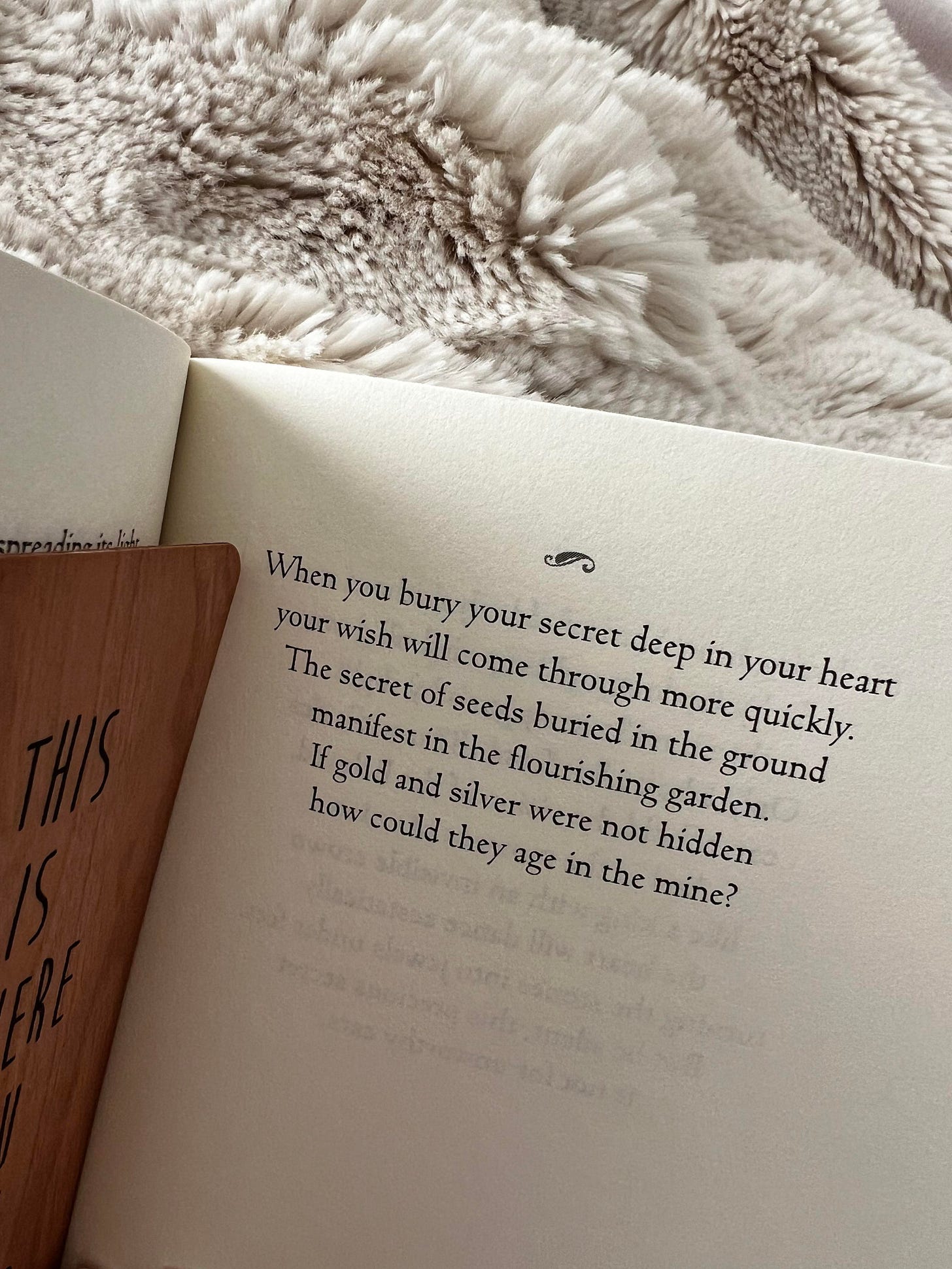Series: 🇵🇭 Filipiniana: Writings about my own culture
Even the world’s most powerful search engines would not surface the correct and complete translations that encompass the full essence of the Filipinos’ traditional ideals for modesty and humility.
Imagine my surprise when a translation of Rumi’s writings (in Rumi’s Little Book of Life by Maryam Mafi and Azima Melita Kolin) captured it beautifully, and I quote:
When you bury your secret deep in your heart your wish will come through more quickly. The secret of seeds buried in the ground manifest in the flourishing garden. If gold and silver were not hidden how could they age in the mine?
The word in Tagalog (our national language, also called 🇵🇭Filipino) is “kababaang-loob”. The pronunciation is syllabic, meaning the word is pronounced with clear distinctions between each syllable: /kah-bah-bah-ahng | loo-oob/.
The first part, “kababaang” means “to lower”.
The second part, “loob” means “state of mind, will, behavior, courage, pride”.
When combined together, it literally means “to lower one’s will or pride”. As a word, it reflects how Filipinos demonstrate the values of modesty and humility. In English, these two words may have different meanings but for us, they are one and the same. One can argue that these two words may be different but they always coexist and are dependent on each other.
When I was growing up, I had an inkling of the level of comfort we had in life. We would not have been found wanting. Our needs were always met and then some wants, mindfully given to us. Our elders, especially our maternal grandparents and then our own parents, would often remind us to live simply, be modest, and to not flaunt what we had especially among others who did not have the same means.
They did not explain it in so many words. They showed it in deeds.
Our Lolo (grandfather) would demonstrate it by sharing anything he had, not just with family but also with the surrounding community in our little barangay (village). Anything our family owned was “communal”. Whenever we were riding our car towards the town proper, as long as there was room for more people, we would stop for every single person walking on the road. According to our Lolo, not stopping for them is flaunting what we had and that was not how a properly raised individual should behave. We were taught that the people we see everyday were people working with us and not for us. We were taught that we were not at the top with others lower than us, we were people working side by side with others to achieve a common goal.
Our Lola (grandmother) just showed it. Even in the presence of several sets of hand to help her with household chores, she would do the chores alongside each of them. She was a teacher who ran the only primary school within several square miles and still, she would come home to cook her entire household fresh dishes from scratch every single night without relying on any of our “kasambahay” to do it for her. Lola would often remind me to never flaunt, never boast. To do so is to be shameless. She taught me that it was better to be underestimated by others than to call attention to myself. She would be often heard saying jokingly, “To praise yourself is like greeting your own self good morning every single day without remembering to greet others around you.” Then she’d look at me and say, “Jen-Jen, are you going to just say good morning to yourself all the time?” And, I would say, “No, Lola!” before we laughed at our own banter.

I have been away from home for two decades now and my grandparents are long gone. Social media has changed the way of life and has globalized self-promotion in more ways than one. I want my nieces and nephews to be reminded of how we were taught and for them to follow the tradition. That is why I am writing this.
I realized that in so many ways, especially superficially, I am as American as any other person in this country. To my very core, though, I am still the girl that my grandparents raised in a tiny Southern Philippine village. I still crave for the simplicity, modesty, and humility that allow me some privacy for my own hopes and dreams.
At work, I prefer to listen and give space for others in meetings. If someone already said what I had to say, I let the conversation move along. When I speak, it has to be of an added value and not just because I want others to hear my opinions. While others get stuck in the cycle of wanting to be heard, wanting to speak, wanting to say more, wanting to add their thoughts - I am at peace with just listening and letting others take the spotlight. I have nothing left to prove. I know who I am and who I am is enough.
I have observed many leaders in this lifetime and a lot of them are preoccupied with the need to manage up and self-promote. Less than a minute of scrolling on LinkedIn would show you what I mean. In the Western culture, “me” and “I” take centerstage.
Rumi beautifully states my leadership style:
The secret of seeds buried in the ground manifest in the flourishing garden.
My pride and joy is when members of my team flourish and grow. I do not take pride in recognitions that I get for myself alone.

If gold and silver were not hidden how could they age in the mine?
I find peace in staying under the radar. I am fine with staying hidden in the mine.

How amazing is it that this age-old ethos of a tiny nation is reflected in the writings of someone who came from another time and another world?
Perhaps, it is a reminder for us about the importance of looking back to our heritage and paying our respects to the wisdom of our elders and the ones that came before them.
This Filipiniana Series is an exploratory writing about the Philippine culture from the perspectives of a Philippine-born and raised Filipina. My goal is to explain commonly misunderstood mindsets and aspects of my culture. I will focus on the positive aspects of these cultural maxims, although I am not denying that there are negative sides of it as well. The web is ripe with the negative sides of my culture, I will not add to that clutter. Allow me to retake these seldom-explained and rarely-defended cultural values here in my tiny corner of the multiverse.
Reflections:
💞 How do you demonstrate the values of modesty and humility in your life?
💞 What is the difference between your own cultural ethos and mine?







Im not sure where or how I learned it, or maybe it’s an innate trait, but I also feel like you, at peace to listen and allow people to speak and have their opinions heard. I too try to add value if I speak. I hope to give others an open mind and an open heart. Thanks for this real lesson on your culture Jen, they are all so informative and add real value by opening up our minds and our eyes to a whole new world. And for me it helps to bring me closer to the perspective that we are all precious and sacred. 🙏🏻😌🫶🏻